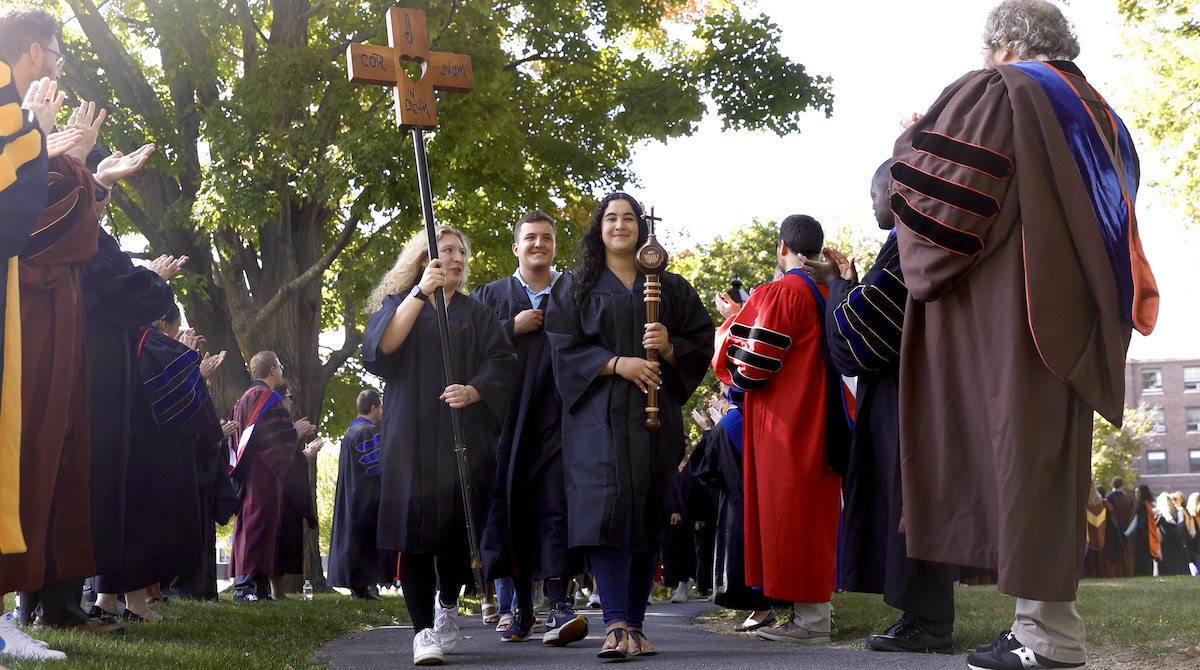A master’s degree in athletic training opens up a whole universe of health care job opportunities.
The U.S. Bureau of Labor Statistics projects a 20 percent increase in the athletic training job market over the next decade. And much of the growth is being driven in sectors that fall outside traditional careers for athletic trainers.
“There are more options now than ever before,” says Mike Corcoran, a professor of health sciences at Merrimack College. “Among the students who complete our athletic training master’s degree, not all of them will be employed by a sports team or athletic department.”
The National Athletic Trainers Association (NATA) maintains an ever-growing list of “Emerging Settings” for athletic training careers. These alternative jobs for athletic trainers fall outside the realm of competitive sports, and they involve work with diverse populations such as military personnel, children, senior citizens, office workers and medical patients.
Athletic trainers who work in emerging settings require the same credentials as those employed by sports teams, including an athletic training degree and a certified athletic trainer (CAT) license. Moreover, virtually all careers for athletic trainers involve the same set of proficiencies, including:
“Employers are looking for new hires that require little training,” says Corcoran. “That’s true for all kinds of athletic training careers.”
A master’s degree in athletic training confers skills that have value in all kinds of professional settings, observes NATA’s Jessica Daniels in an article titled “Thinking Outside the Career Box.”
“We are able to work under pressure,” she notes. “We are detail-oriented, organized, and can work in many environments. We have been trained to handle almost anything that comes our way. This ability can translate into opportunity.”
NATA lists half a dozen emerging settings for athletic training careers. Each setting, in turn, encompasses a wide range of employers and specialized professional niches. The list includes:
Industries that involve intense physical activity often seek athletic trainers to provide provide preventative services, emergency care, clinical examination, and rehabilitation for the workforce. You can find jobs for athletic trainers in manufacturing, construction, shipping, warehousing, landscaping and similar industries.
All branches of the U.S. armed forces offer career opportunities for athletic trainers in noncombat environments. Military athletic trainers provide on-site health care to cadets, active-duty personnel, reservists, veterans and administrative personnel.
Certain types of specialized medical practices employ athletic trainers to act as the “quarterback” of the care team. In these careers, athletic trainers often perform initial consultation and diagnosis, devise and implement treatment plans, coordinate care among multiple providers, and serve as the main point of patient communication. Doctors who frequently have jobs for athletic trainers include orthopedists, surgeons, oncologists and gerontologists.
Many athletic trainers work with police and fire departments, emergency responders, homeland security agents and others who protect the public. Job duties range from basic conditioning to on-site care, injury diagnosis, treatment planning and long-term rehabilitation.
Dancers, musicians, singers and many other kinds of performers require finely tuned bodies. Cultural organizations represent a growing career niche for athletic trainers.
“Everyone is an athlete,” wrote best-selling author and physician George Sheehan. “The only difference is that some of us are in training, and some are not.” As that philosophy gains traction in society, the range of athletic training careers will continue to widen.
“There are more options now than ever before. Among the students who complete our athletic training master’s degree, not all of them will be employed by a sports team or athletic department.”
― Mike Corcoran, Professor of Health Sciences
To talk to someone about the athletic training master’s degree, contact the Merrimack College Office of Graduate Admission.
Create your account to get started. The deadline to apply for the spring term is January 9th.
"*" indicates required fields
Stephanie Garrone-Shufran, associate professor in the School of Education and Social Policy and 2024 Roddy Award winner, delivered the event’s keynote speech.
